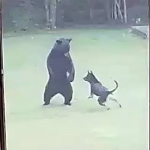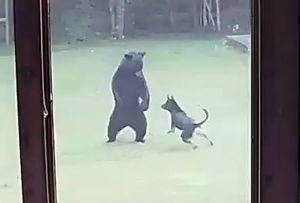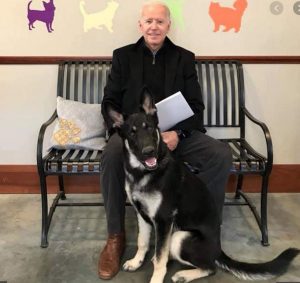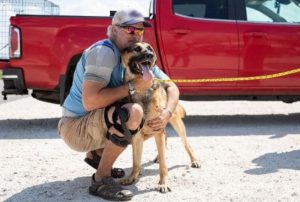Below are problems I’ve heard of with puppies that are around 7 weeks old or older. These are not all problems I have personally experienced. For the most part these are questions I’ve had myself and just haven’t had time to turn into blog posts, but I wanted to get them onto the website. So, I have turned this page into a poorly organized FAQ.
I will add more to this list in the future as I bump into puppy issues or random Q&A.
Possible Cryptorchid: This is an issue I personally dealt with. In males, the testicles do not drop at the same time. So, when do the testicles drop? Who knows! At 7 weeks of age I took a litter to the vet. There were 7 males. 4 had testicles down, 3 did not. I conclude that at 7 weeks of age the chances of both testicles being present are around 50%. In a couple of the males, the testicles were down at 9 – 11 weeks of age. This means that puppy goes home with the new owner before both have dropped. Even if a testicle doesn’t drop, it is not a problem- getting it taken care of at neutering time is a very minor procedure. If you google Cryptochid online you will see all sorts of information about testicular cancer and other problems. I guess if the testicle never descended and you left it in them it could cause a problem. But, every pup to ever leave here eventually had their testicles drop just fine. I WOULD caution anyone that is trying to find their dog’s testes- don’t over-think it. If they are not right there just leave the poor dog alone. 🙂 Gently check once a week by feeling the sac. DO NOT push around looking for the other one. DO NOT let your vet push around looking for the other one either. Yes, it is in there, and even if they find it, this changes nothing, there is not a rash of dogs being born with one testicle.
Congenital Heart Defect: AKA Heart murmur / innocent heart murmur / circulatory anomaly / benign heart murmur. On one of my litters the smallest guy had a “heart murmur”. Well, I was terrified. A vet had told me that the pup could keel over at any moment. I called a good friend that I try not to bother with my silly daily puppy questions- I just bug her once a year and she is thrilled to answer my “good” questions. She has bred the German show line shepherds for 30+ years and has puppies worldwide. She asked me “Was it the small boy?” I said yes. She replied with “Just take him back in a week or two and his heart will sound normal; he is fine, he just isn’t finished developing yet.” I could hardly believe my ears. This extremely experienced breeder shrugged it right off like absolutely nothing was wrong. And, of course, she was 100% correct. So, why did the vet terrify me? I am left to guess. A very experienced emergency vet once told me that when they get animals in they do not know the history and they are forced to make assumptions on the spot which are not always accurate. I have also come up with a theory of my own. Sperm lives in the female for 5 days. Not all eggs get penetrated at the same time. When the mom goes into labor, some of the pups may be a couple of days younger than the others! Makes sense, right? Thankfully I only had to deal with this one time. If I were to run into this again I would know from experience which variables to take into account. Was the pup under 1lb at birth? Is he otherwise completely healthy? Does he get tired easily? If all signs are normal, there is absolutely nothing wrong with Mr. Puppy. If a vet hears an anomaly at 7 weeks, take the pup back at 9 weeks and all will be fine. Don’t bother reading about heart problems online, you will only scare yourself.
Puppy doesn’t like their food: One or two of the pups that left here didn’t want to eat when they got home. Rest assured, they will. If you get a puppy and want to change their food, feel free to do so. AFTER they have adjusted. I personally give dogs one change at a time. If they just went to a brand new home, let them stay on whatever the breeder was feeding them for a few days. If they don’t eat, it is ok. This is their first time away from mom. They have just arrived in a new universe and eating some puppy chow may not be their top priority. Yes, if you pull something out of the fridge, they’ll devour it, but, don’t do it, just relax, they will eat.
Crate training: I could write a whole book on this but the most important thing I can tell people about crate training is that dogs are pack animals and this needs to be a happy place. When I raise pups I give them a crate to play with with no door on it. They fight over who gets to use it. That is the extent of what I do with pups before they go to a new home as not everyone wants to use a crate. For puppies I am keeping, I give them little 5 minute sessions in a locked crate with a tasty peanut butter treat. I am sure to unlock the door and open it BEFORE they whine. Then, they are used to having the door closed. The first night they spend in the crate they are going to whine for 5 minutes or so (my pups, other inexperienced pups may whine a whole lot longer). Anyways, do not under any circumstances reward this whine. Mom has dedicated the last several months of her life to IGNORING whining. This is the best thing you can ever do for your pup, is ignore them if they whine. Reward the good, ignore the bad, never punish a puppy. They can’t hold it all night. Wake up and take them out twice each night. RACE them outside (or carry them), as they will start going about 1 second after they get out of the crate. By 10-12 weeks you can take them out once a night and before you know it leaving them in their crate for 6-8 hours (once each day) is perfectly fine.
Diabetes: Does your puppy have diabetes? 99.99% chance, No.
Is my puppy deaf? To make a very very long and weird story short, a vet once tried to convince me, with some success, that a puppy was deaf. The puppy is not deaf. I almost checked myself into a nut house at the end of this fiasco. Deafness does happen in dogs with white fur.. If your dog is ignoring you or sounds, GOOD. He/she will stop in a day or two. This is FAR better than a dog being alarmed or scared of noises. Don’t worry, be happy. I came up with a test for this, email me if you need it.
Should I remove the dew claws? I very recently heard of “dew claws”. Some vets recommend that they are removed (other vets refuse to do the procedure). Would you cut your thumb off? The dew claw IS used, at least on a GSD. There are 5 separate tendons used to operate this member. I do know that my shepherds use them. They are always filled with dirt and worn just like the other claws. One article I read suggested that removing them can lead to arthritis. Again, I am pretty dewclaw ignorant but removing them had never crossed my mind. At least with GSDs, they should be left on. Other breeds, and cats, I know very little about and can’t comment- maybe there are benefits, or maybe there are cases where removing them is necessary, and I also read that the breed standard is to remove them on ALL pups 48hrs after birth, so, it seems that in some dogs, yes, remove them, on GSDs, leave them on…
Ear infections: It seems pups are susceptible to them. I just get the antibiotics from the vet, although they do dish them out every time there is a “yeast smell”. They typically like to take a swab and go look at it under a microscope to confirm that there is bacteria, which, of course, there always is. No matter how sterile the environment, puppies roll in dirt and step in poop and claw each other or scratch their ears and sometimes ear infections happen, especially here in North Carolinawhere there is just a load of bacteria present. Even if they do not have one when they go home, these seem fairly common at some point in the first year of a pup’s life. Clean them regularly.
This also reminds me: be sure to play with your pup’s ears on a regular basis. I personally feel between the toes and play with their ears daily. DO NOT let your vet clean the pups ears if the dog is uncomfortable with it. I have personally seen a terrified puppy get fed snacks as it whined and had his ears cleaned. This reinforces the dog’s fear of having his ears cleaned and could potentially create a decade of angry ear cleaning experiences! My dog knows when she is about to get her ears cleaned. She sees the rag coming and the bottle of solution and tries to hide but I have her lie down and she “tolerates it” just fine. I only clean Aura’s ears once a month but some dogs need it weekly.
Panosteitis / Pano: I have heard of large breed dogs, GSDs specifically, getting panosteitis. This can happen anytime in the 5 – 18mo old range. Some vets will suggest Xrays and all sorts of things. See the link above for more info. Experienced breeders will tell you to give them an aspirin. If you know the history of the dog and it comes from good lines I would think that pain management is more than adequate. Xrays can see if there are “underlying problems”, however, if the dog hasn’t been running too much or jumping off of things too high for him (overworked), experienced breeders tell me that Xrays are completely unnecessary. I have head that this is common and goes away all on its own and that if aspirin isn’t helping to get Rimadyl. I have never personally experienced this, but if the dog is from good lines, I am told that treatment is not needed whatsoever, it is a “self limiting” condition.
Fear: This is another section that needs a book dedicated to it. In the 8-16 week range pups will be afraid of something. Thunder, a cat, the tea kettle, gun fire, birds, the dark, their kennel, water, rain, wet grass, whatever. Some people’s first reaction is to “comfort” their pup like a child. DO NOT do this. Ever. Never ever. Ignore the bad, reward the good. Your pup does not want this. He/she wants to grow up to be a confident dog, and if you comfort them while they are displaying fear you are going to instantly create a fear that may last a lifetime. It can take years to undo 30 seconds of coddling. Again, they will show fear eventually, this is normal, just ignore it- this teaches them that they should not be afraid of whatever it is they were showing fear for.
Joints: Do not let your puppy jump off of things. Not even the couch. Do not overwork a puppy. Their bones and joins are developing, hurting them early will result in problems. They are very eager to please you and may be excited to jump in and out of cars. You will need to proactively prevent them from jumping – they will try. Be careful!
Are puppies good for kids? Sure! Just be sure the kids can handle the puppy. You do not want kids carrying around puppies if they are going to drop them. You do not want kids comforting puppy when they are scared, etc., as seen above.
Is there a runt? I have spent a lot of time outdoors and watching shows about wild animals. Just because different dogs are different sizes at birth does not indicate a runt. I have never seen one but some dogs can be so small they can not feed on their own. Maybe that would be a runt. Maybe if there are 12 puppies and one is so tiny it gets pushed out of the way by the others before he/she can feed and it would die without human intervention. Maybe that would be a runt. A runt, by definition, is abnormally small. In my experience I have, fortunately, only seen healthy pups. Some will come out at 14oz. Some will come out at 24oz. Bigger is not better. I can assure you of one thing. When they are old enough to walk, in the wild, I would expect the biggest to be among the first eaten by a predator. Natural selection (not that GSDs are born in the wild)… When the pups run to mom the biggest is always the very last to make it over the staircase or the last hump where she is. They are always the slowest as well. A lot of people think the biggest pup is the best or the “pick of the litter”. This is not the case at all. If the smallest pups is healthy, there simply is no “runt”. I have tracked our smallest and they are 100% healthy and the same size as all of the other pups to leave here. GSD breed standard is males at 90lbs max. I have heard so many times “Man, I met a GSD once that was 130lbs!”. That is fine; I hope the dog lived a long & happy life, as GSDs were definitely NOT meant to be that size. That is pretty much the same as saying “Man, I once met a full grown shepherd that was only 40lbs!”. See how that sounds? Not very impressive, is it? Anyways, that is my runt rant. Of course, there will be a biggest and smallest to each litter, but the size really is almost always completely irrelevant. At 8 weeks of age, a 16oz pup at birth may be 7lbs, and one that was 18oz may by 9lbs, so the difference may appear HUGE, and everyone wants the healthiest pup they can get, but, after spending so much time with puppies, I am 100% certain that of all the factors people should consider when getting a puppy, size is not one of them or should be the least important factor 99.9% of the time. This is a case where size does not matter.
When will a German Shepherd’s ears stand up? In my experience, 4-8months. Every pup that has left here had the ears go up naturally. The bigger the ear, the longer they take to go up! (if you read my runt rant above, this is just another sign that points to the smaller dogs being as good or better than a larger pup). There is 1 specific insert on the market that I have heard works very well. If you need to know the name email me and I’ll dig it up. It is $25. We had a large male pup leave here and his ears took a solid 8 months to come up, females are big (but not as big) and some of their ears are up in the 4-6mo range.
How do I pick a vet? Please note, I am not anti-vet. Overall, I like vets. I have an unusual amount of experience with vets and have come to dislike many of them but there are still plenty that I love, for example, I highly recommend the folks over at NCSU- they have some real geniuses there. If you need an animal spayed, well, that is something nearly any vet can handle. As for a vet that meets YOUR needs, well, you’ll probably have to shop around. I personally have a vet in a small town 1mi away from me which I am satisfied with. Not all vets have the same equipment, and the amount of equipment they own does not indicate that they are better than the next vet. Most vets that I’ve come across are a bit rusty with the breeding process but are fantastic at curing normal dog issues, and, let’s face it, a lot of medication simply can’t be purchased without a prescription and rabies shots are the law, so, you’re going to have to find one! I always ask if they “like” GSDs. Sounds silly, but, I actually had 1 vet tell me that they were terrified of shepherds. That was an easy one to cross off of my list!
Do I need the kennel cough vaccine? No. When I find the article I’ll add it here. It is a good read. The short answer is no. If you are boarding a dog some dog hotels require the vaccine. If you have an indoor dog that isn’t exposed to other sick dogs the vaccine is useless at best and can actually cause problems. I get all pups leaving here all of their shots EXCEPT this one. The shot itself is usually $12 or something- it isn’t the price.
Can my puppy be with other dogs? A puppy’s immune system is really not in full effect until they are 16 weeks old! Be careful of what you expose them to. Some canine colds are fatal for pups under 16 weeks old.
Do puppies need rabies shots? Yes. The first rabies shots are given in a series. Rabies shots also vary from state to state. When I send pups home they come with records. If you bring a pup home at 8wks of age expect to bring them back in to the vet again in the near future.







